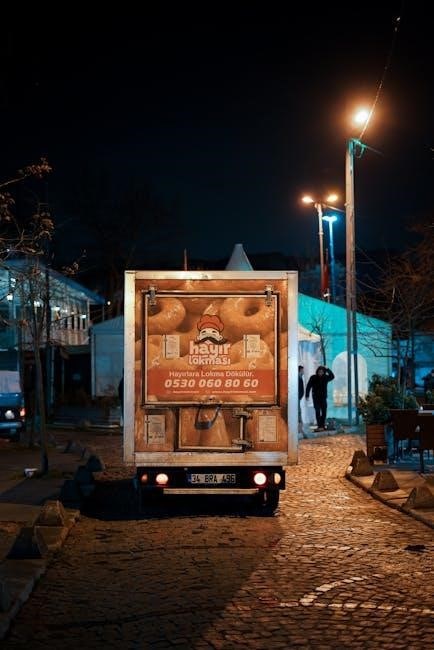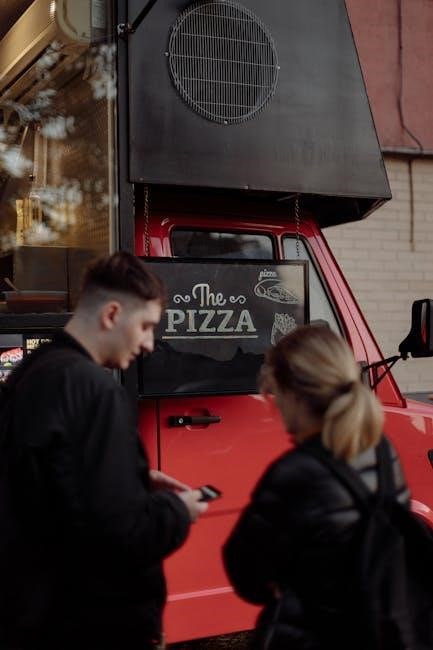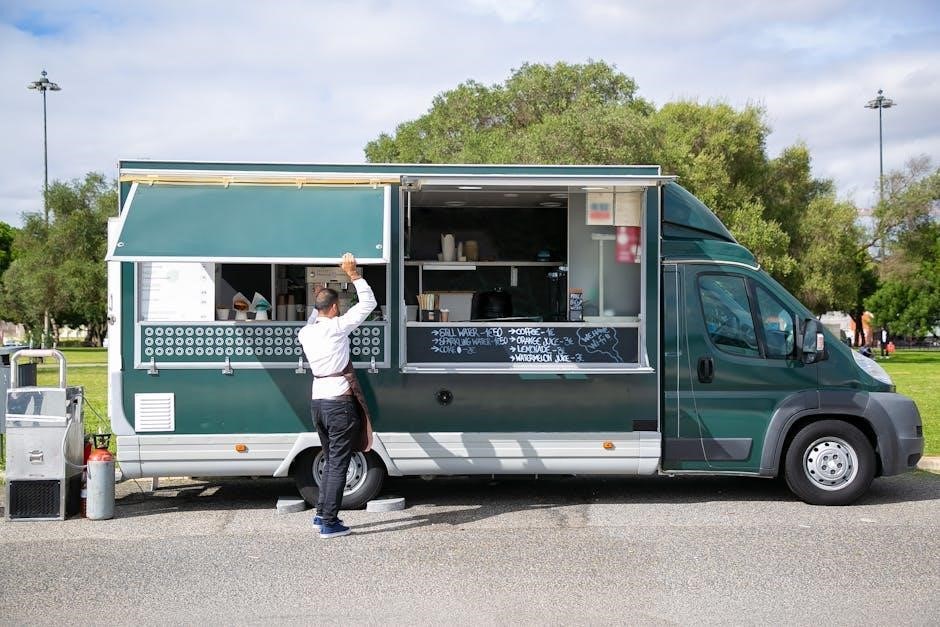Executive Summary
This food truck business plan provides a clear roadmap for launching and managing a successful mobile food business․ It outlines the vision, financial strategies, and operational plans needed to achieve long-term growth and profitability in the competitive food truck industry․
Business Overview
The food truck business operates as a mobile culinary venture, offering a diverse menu tailored to local tastes and trends․ By leveraging strategic locations and flexible scheduling, the business aims to maximize visibility and customer engagement․ Key offerings include high-quality, affordable dishes made with fresh ingredients․ Marketing strategies such as social media promotion, partnerships with local vendors, and sampling events will drive brand awareness․ The business model emphasizes adaptability, enabling quick responses to market demands and competition, ensuring long-term sustainability and growth in the dynamic food truck industry․
Vision & Objectives
Vision: To become the most sought-after food truck brand, celebrated for innovative cuisine, exceptional quality, and unforgettable customer experiences․ Objectives: Expand operations to key locations, achieve a customer satisfaction rate of 95%, and introduce seasonal menus to stay ahead of culinary trends․ By focusing on sustainability and community engagement, the business aims to build a loyal customer base and establish itself as a leader in the mobile food industry within the first three years of operation․

Company Overview
Our food truck company, established in 2023, operates in urban areas, offering diverse, high-quality street food․ We aim to deliver exceptional taste and convenience to our customers․
Mission Statement
Our mission is to serve high-quality, diverse, and flavorful street food that exceeds customer expectations․ We aim to create memorable dining experiences, fostering community connections and satisfaction․ By sourcing fresh ingredients and maintaining sustainable practices, we strive to be the preferred food truck choice in every location we visit․ Our dedicated team is committed to innovation, excellent service, and building lasting relationships with our customers and partners․
Business Structure
Our food truck business operates as a limited liability company (LLC), providing liability protection and tax benefits․ The ownership structure includes two founding partners, with one serving as CEO and the other as CFO․ A skilled management team oversees daily operations, including an Operations Manager, Head Chef, and Marketing Lead․ The business will function as an independent entity, with plans to franchise in the future․ Key decisions are made collaboratively, ensuring alignment with strategic goals․ A dedicated finance team handles accounting, while an advisory board of industry experts provides guidance and support․

Products & Services
Our food truck offers diverse cuisine, including gourmet burgers, fusion tacos, and customizable salads․ Specialty items like vegan options and gluten-free dishes cater to varied tastes․ Services include catering for events and festivals, ensuring flexibility and broad appeal․ Quality is ensured through fresh, locally-sourced ingredients, enhancing the overall dining experience․
Menu Offerings
Our food truck features a diverse menu with a focus on fresh, locally-sourced ingredients․ Main offerings include gourmet burgers, specialty sandwiches, and global-inspired dishes like Korean BBQ tacos․ Sides such as crispy fries and fresh salads complement the meals․ Vegetarian, vegan, and gluten-free options are available to cater to diverse dietary needs․ Seasonal specials and limited-time offers keep the menu exciting and dynamic․ Customization options allow customers to tailor dishes to their preferences, ensuring a personalized experience․
Pricing Strategy
Our pricing strategy balances affordability with profitability, targeting a competitive price point of $8-$12 per entree․ Value meals and combo deals will attract budget-conscious customers, while premium options like organic or grass-fed meats cater to health-focused buyers․ Discounts for bulk orders and loyalty rewards encourage repeat business․ Transparent pricing ensures customer trust, with clear menu boards displaying all options․ Seasonal specials and limited-time offers will create urgency, driving sales without compromising margins․ This approach ensures accessibility while maintaining quality and profitability․

Market Analysis
The food truck industry is growing, driven by increasing demand for mobile dining․ Targeting urban professionals and families, the market thrives on convenience and diverse offerings․
Industry Overview
The food truck industry has experienced remarkable growth in recent years, driven by urbanization and the rising demand for convenient, diverse dining options․ Consumers increasingly favor unique, high-quality food experiences that food trucks provide․ The industry benefits from technological advancements, such as mobile ordering apps, enhancing customer convenience․ Additionally, there’s a growing interest in specialty and gourmet offerings, further expanding market potential․ However, increased competition necessitates continuous innovation and excellent customer service to stand out in this dynamic sector․
Target Market
The target market for the food truck business includes young professionals, students, and families seeking convenient, affordable meals․ Urban areas with high foot traffic, such as business districts, parks, and event venues, are ideal locations․ Additionally, late-night diners and health-conscious individuals represent growing demographics․ The business will cater to diverse preferences by offering a variety of menu options, ensuring broad appeal and consistent customer flow․ This focus on accessibility and flexibility will help attract a loyal customer base and drive repeat business․
Competitive Analysis
The food truck market is highly competitive, with numerous established vendors offering diverse cuisines․ Key competitors include popular food trucks known for their signature dishes and strong branding․ However, many lack innovation in menu offerings and online presence․ Our food truck will differentiate by introducing unique fusion dishes, enhancing customer experience through superior service, and leveraging social media and technology for engagement and convenience․ By focusing on these areas, we aim to capture a significant market share and establish a loyal customer base․

Marketing & Sales Strategy
Strategic parking locations, social media engagement, and word-of-mouth referrals will drive customer acquisition․ Limited-time offers and discounts will attract new customers and boost sales․
Branding & Identity
The food truck will have a vibrant, modern design with a catchy name and logo to stand out․ The brand will emphasize freshness, quality, and affordability․ Social media will showcase the truck’s unique personality through engaging content and storytelling, creating a loyal customer base․ Consistent branding across menus, packaging, and online platforms will reinforce the truck’s identity and build trust․ The goal is to create a memorable experience that reflects the brand’s values and resonates with the target audience․
Promotional Activities
The food truck will engage in regular social media promotions, offering exclusive discounts to followers․ Collaborations with local businesses and influencers will expand reach․ Seasonal specials and limited-time offers will create buzz․ Participation in food festivals and events will increase visibility․ Loyalty programs, such as stamp cards, will encourage repeat customers․ Strategic parking locations and eye-catching signage will attract impulse buyers․ These activities aim to build a strong customer base and drive consistent sales growth for the business․
Operational Plan
The food truck will operate daily, managing inventory, staffing, and customer service efficiently․ A detailed schedule ensures smooth operations, including supply chain and waste management processes․
Logistics & Equipment
The food truck will be equipped with a fully functional kitchen, including refrigerators, fryers, grills, and point-of-sale systems․ The vehicle will be customized to ensure efficient food preparation and service․
Logistics will focus on maintaining a reliable supply chain for ingredients and disposable items․ The truck will be fitted with necessary safety and hygiene equipment to meet health regulations and ensure smooth operations․
Staffing & Training
The food truck will require a team of 4-5 staff members, including a chef, customer service staff, and a manager․ Hiring will focus on individuals with prior food service experience and strong interpersonal skills․
All staff will undergo comprehensive training in food safety, customer service, and equipment operation․ Training will include hands-on kitchen drills and customer interaction simulations to ensure readiness․
Permits & Licenses
Obtaining necessary permits and licenses is crucial for legal operation․ The food truck must secure a food service permit, business license, and health department certification․ Fire safety inspections and equipment permits are also required․ Additional permits may be needed for specific event locations․ Annual renewals and compliance with local regulations will ensure uninterrupted operations․ Proper documentation and display of licenses are essential to avoid penalties and maintain customer trust․
Financial Plan
The financial plan outlines funding allocation, budgeting, and revenue forecasting․ It ensures sustainable operations and growth, with detailed break-even analysis and profit projections․
Startup Costs
Startup costs for a food truck business include purchasing the vehicle, kitchen equipment, permits, and initial inventory․ The food truck itself is the largest expense, ranging from $50,000 to $200,000, depending on size and features․ Additional costs include kitchen appliances, point-of-sale systems, and branding materials․ Permits and licenses vary by location but typically cost $500 to $5,000 annually․ Initial inventory and supplies, such as food, ingredients, and packaging, add $2,000 to $5,000․ These costs must be carefully budgeted to ensure a successful launch․
Revenue Projections
The food truck business is projected to generate $250,000 in annual revenue in the first year, based on average daily sales of $800 and 300 operating days․ Revenue is expected to grow by 10% annually for the next three years, reaching $330,000 by year three․ This growth will be driven by increased brand visibility, expanded menu offerings, and strategic location choices․ These projections align with industry benchmarks and reflect a conservative yet achievable growth trajectory for the business․

Launching the Business
The food truck will launch with a grand opening event, showcasing the menu and creating buzz through social media and local partnerships to attract initial customers․
Pre-Launch Preparations
Pre-launch preparations involve finalizing the menu, securing necessary permits, and setting up the food truck kitchen․ Staff training will focus on efficiency and customer service․ Location scouting and scheduling will ensure prime spots․ Marketing materials, including social media and flyers, will be prepared to build anticipation․ A soft launch with limited hours will test operations and gather feedback․ Final checks on equipment, inventory, and safety protocols will be completed to ensure a smooth start․
Launch Strategy
The launch strategy begins with a grand opening event, featuring discounts and promotions to attract initial customers․ Social media campaigns will build anticipation, with countdowns and behind-the-scenes content․ Partnerships with local businesses and influencers will enhance visibility․ The food truck will debut at high-traffic locations like festivals or busy streets․ Clear signage and branding will ensure visibility․ Feedback from the first week will guide adjustments to the menu or operations․ A well-executed launch will set the tone for long-term success and customer loyalty․

Risk Management
The food truck business faces risks like health inspections, location disputes, and equipment failures․ A comprehensive risk management plan includes regular inspections to meet health codes, securing permits, and maintaining insurance․ Contingency plans for bad weather or low foot traffic are essential․ Diversifying locations and having backup equipment can mitigate operational disruptions․ Monitoring market trends helps address competitive pressures․ Effective risk management ensures sustained operations, protects assets, and maintains customer trust, ultimately safeguarding the business’s long-term viability and reputation in the competitive market․
Funding Requirements
The food truck business requires an estimated $100,000 in startup funding to cover initial costs․ This includes purchasing a food truck ($50,000), kitchen equipment ($20,000), permits, and marketing․ Additional funds will be allocated for inventory, staffing, and operational expenses․ Financing options include loans, investors, or personal savings․ A detailed breakdown of costs ensures transparent use of funds․ Securing funding is critical to launching and sustaining operations effectively, with a focus on maximizing returns and achieving long-term business growth in the competitive food truck industry․

Legal & Compliance
Ensuring legal compliance is crucial for the food truck business․ Necessary permits include food handling certification, health department approval, and fire safety inspections․ Business registration and food service licenses are mandatory․ Liability insurance is required to protect against potential claims․ Compliance with local health and safety regulations must be maintained․ Regular audits and inspections will ensure adherence to standards․ Failure to comply may result in fines or operational shutdown․ Staying informed about local laws and regulations is essential to avoid legal issues and maintain smooth operations․
Branding & Customer Experience
Strong branding is essential for attracting and retaining customers․ The food truck’s visual identity, including its name, logo, and color scheme, should reflect its unique personality․ Consistent branding across social media, menus, and marketing materials builds recognition․ Customer experience is equally vital, with friendly staff, clean presentation, and high-quality food fostering loyalty․ Engaging with customers through social media and loyalty programs enhances satisfaction․ A memorable brand and exceptional customer experience drive repeat business and positive word-of-mouth, ensuring long-term success․

Technology & Tools
Efficient technology and tools are critical for streamlining operations․ A mobile POS system enables quick transactions and tracks sales data․ Inventory management software ensures stock levels are monitored and replenished․ Scheduling tools help manage staff shifts and location bookings․ Data analytics provide insights into sales trends and customer preferences․ Social media management tools enhance engagement and marketing efforts․ Implementing these technologies improves efficiency, reduces costs, and enhances customer satisfaction, ensuring the food truck runs smoothly and remains competitive in a dynamic market environment․
The food truck business plan outlines a clear roadmap for success, combining a strong vision with actionable strategies․ By focusing on a unique value proposition, understanding the target market, and implementing efficient operations, the business is well-positioned to thrive․ Emphasizing quality, customer experience, and financial discipline will drive long-term sustainability․ This plan provides a comprehensive framework to launch and grow a profitable food truck venture, ensuring it stands out in a competitive market and achieves its objectives effectively․

Next Steps
With the business plan finalized, the next steps involve securing funding, finalizing permits, and purchasing equipment․ The menu and branding should be finalized, and staff recruitment can begin․ A detailed launch timeline will ensure all preparations are completed efficiently․ Marketing campaigns should be activated to build anticipation․ Regular progress reviews will help maintain momentum and address any challenges promptly, ensuring a smooth transition from planning to operational phases․




Leave a Reply
You must be logged in to post a comment.